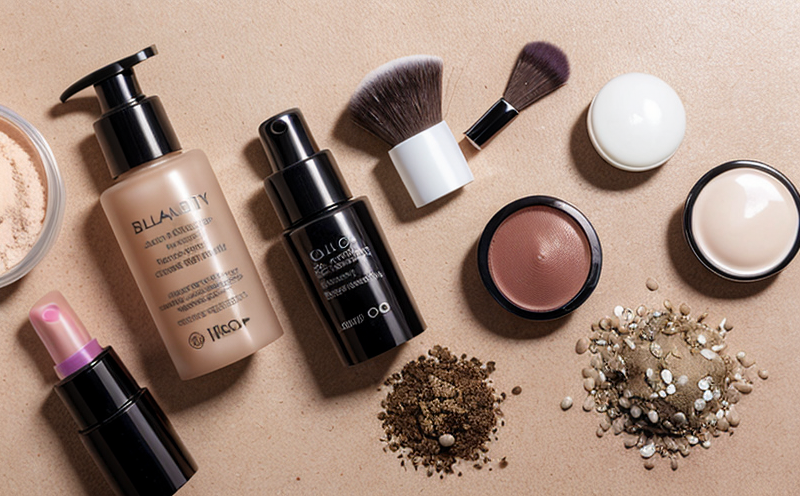Biodegradability Testing of Cosmetic Polymers
The biodegradability testing of cosmetic polymers is a critical aspect in ensuring environmental compliance and sustainability. As society increasingly demands more eco-friendly products, the ability to demonstrate that these materials can decompose safely into natural elements without leaving harmful residues becomes paramount for manufacturers. This service is tailored towards quality managers, compliance officers, R&D engineers, and procurement teams who are responsible for selecting sustainable ingredients and testing their environmental impact.
Cosmetics, particularly those containing synthetic polymers, are often criticized for their non-biodegradability in the environment. However, with advancements in technology, many newer cosmetic formulations incorporate biodegradable polymers to minimize ecological harm. To ensure these materials meet regulatory standards and public expectations, rigorous testing is necessary.
The process involves simulating real-world conditions where biodegradation occurs naturally, such as soil or marine environments. During this simulation, the polymer's ability to break down into simpler compounds by microorganisms is assessed over a defined period. The key parameters measured include weight loss, CO2 evolution, and degradation rates under various temperature and moisture levels.
Accurate and reliable biodegradability testing requires meticulous sample preparation and handling. Samples must be preconditioned according to the chosen ISO or ASTM protocols before being introduced into the test environment. This ensures that any observed changes are attributable solely to the biodegradation process rather than external factors like hydration or temperature fluctuations.
For soil-based tests, samples are mixed with a specific type of soil and incubated at controlled temperatures over several weeks or months depending on the polymer's expected lifespan in natural conditions. Regular monitoring allows us to track changes in weight and CO2 production, which serve as indicators of successful biodegradation.
In marine environments, similar procedures apply but require specialized equipment capable of simulating seawater salinity and temperature fluctuations accurately. Here too, we measure the rate at which polymers decompose into harmless substances like carbon dioxide and water vapor.
The results of these tests are crucial for regulatory compliance purposes as well as internal quality assurance programs. They help companies make informed decisions about their product formulations while also providing evidence to stakeholders regarding their commitment to sustainability practices.
Regulatory bodies such as the European Commission, United States Environmental Protection Agency (EPA), and others have established guidelines that mandate certain levels of biodegradability for various types of packaging materials. Our laboratory adheres strictly to these standards when conducting biodegradability tests on cosmetic polymers ensuring accuracy and consistency across all projects.
Understanding the full lifecycle impact of our products is essential not only from an environmental perspective but also from a business standpoint. Consumers today are more environmentally conscious than ever before, making it vital for businesses to demonstrate their dedication towards reducing waste and promoting sustainability through responsible sourcing practices.
Scope and Methodology
Our biodegradability testing service covers the evaluation of synthetic polymers commonly used in cosmetic products. This includes polyethylene, polypropylene, polystyrene, as well as newer biodegradable alternatives like polylactic acid (PLA) and polyhydroxyalkanoates (PHAs).
The primary focus is on assessing how quickly these materials break down under natural conditions without causing any harm to the environment. We use both terrestrial and aquatic testing methods depending on the intended application of the polymer.
- Terrestrial Testing: Samples are buried in a controlled soil environment where they interact with microorganisms present naturally. This method simulates what happens when waste ends up in landfills or agricultural fields.
- Aquatic Testing: For polymers that might end up in water bodies, we conduct tests mimicking marine conditions. These include exposure to saltwater and varying temperatures typical of coastal areas.
The testing protocol involves placing samples into pre-defined test chambers containing either soil or seawater. The samples are then monitored over time using advanced analytical techniques such as gas chromatography for measuring CO2 release, gravimetric analysis for weight loss calculations, and Fourier Transform Infrared Spectroscopy (FTIR) to identify structural changes indicative of degradation.
Our laboratory strictly follows international standards including ISO 14855-3:2016 for soil testing and ASTM D5988-17 for aquatic testing. These guidelines ensure that our results are consistent, reproducible, and comparable with those reported by other laboratories worldwide.
Eurolab Advantages
At Eurolab, we pride ourselves on delivering high-quality biodegradability tests that meet or exceed the stringent requirements set forth by regulatory bodies. Our team of experts has extensive experience in this field and stays updated with the latest developments in both technology and regulations.
- State-of-the-Art Facilities: We possess cutting-edge laboratory facilities equipped with the most sophisticated analytical instruments available today, allowing us to provide accurate and precise results.
- Comprehensive Services: Beyond just biodegradability testing, we offer a wide range of related services including material characterization, chemical analysis, and environmental impact assessments. This comprehensive approach ensures that our clients receive the most holistic picture possible regarding their product's sustainability credentials.
- Dedicated Client Support: Our dedicated client support team is always available to assist with any queries or concerns throughout the testing process. Whether it’s helping interpret results or providing guidance on how best to proceed based on those findings, our aim is always to provide personalized service tailored specifically to each client's needs.
- Global Recognition: Eurolab is accredited by multiple recognized bodies including UKAS and APLAC, ensuring that all our work meets the highest quality standards. This global recognition gives us credibility not just within Europe but across the entire world.
We take pride in maintaining long-term relationships with our clients based on trust, reliability, and excellence. By partnering with Eurolab for your biodegradability testing needs, you can rest assured that you are working with a reputable and experienced organization committed to helping you achieve sustainable solutions for your cosmetic products.





